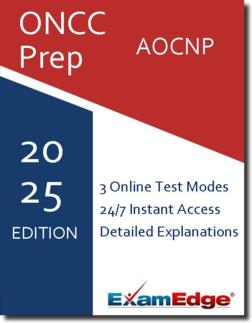ONCC AOCNP (AOCNP) Practice Tests & Test Prep by Exam Edge - Topics
Based on 25 Reviews
- Real Exam Simulation: Timed questions and matching content build comfort for your ONCC AOCNP test day.
- Instant, 24/7 Access: Web-based ONCC Advanced Oncology Certified Nurse Practitioner (AOCNP) practice exams with no software needed.
- Clear Explanations: Step-by-step answers and explanations for your ONCC exam to strengthen understanding.
- Boosted Confidence: Reduces anxiety and improves test-taking skills to ace your ONCC Advanced Oncology Certified Nurse Practitioner (AOCNP) (AOCNP).

Understanding the exact breakdown of the ONCC Advanced Oncology Certified Nurse Practitioner (AOCNP) test will help you know what to expect and how to most effectively prepare. The ONCC Advanced Oncology Certified Nurse Practitioner (AOCNP) has multiple-choice questions The exam will be broken down into the sections below:
| ONCC Advanced Oncology Certified Nurse Practitioner (AOCNP) Exam Blueprint | ||
|---|---|---|
| Domain Name | % | Number of Questions |
| Cancer Continuum | 35% | 35 |
| Cancer Treatment and Supportive Care | 45% | 45 |
| Oncologic Emergencies | 10% | 10 |
| Psychosocial Issues | 5% | 5 |
| Professional Practice and Roles of the APRN | 5% | 5 |


